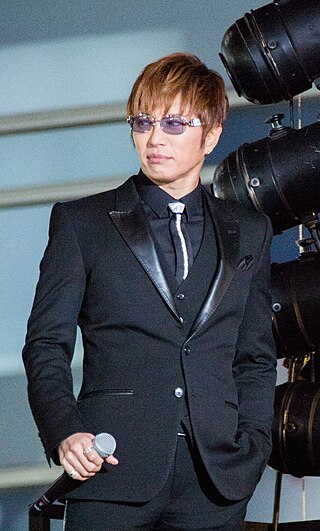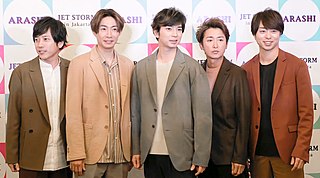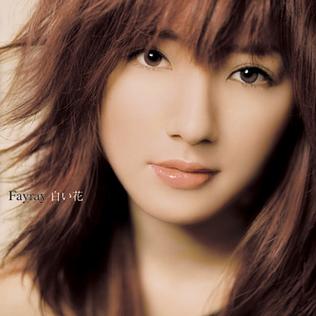
Ayumi Hamasaki is a Japanese singer, songwriter, record producer, actress, model, spokesperson, and entrepreneur. By 2002, Hamasaki had earned the nickname "Empress of J-pop" due to her popularity in Japan and throughout Asia, as well as being referred to as "the voice of the lost generation". Due to her success and relevance throughout her career, she is considered one of the top solo female artists of the Heisei era for her influence on the music industry and various fashion trends.

Gakuto Oshiro, better known by his mononymous stage name Gackt, is a Japanese singer-songwriter, musician, record producer and actor.

Arashi is a Japanese boy band consisting of five members formed under the Johnny & Associates talent agency. The members are Satoshi Ohno, Sho Sakurai, Masaki Aiba, Kazunari Ninomiya, and Jun Matsumoto. Arashi officially formed on September 15, 1999, in Honolulu, Hawaii, and made their debut CD on November 3, 1999. The group was initially signed to Pony Canyon and released one studio album and six singles—beginning with their 1999 eponymous debut single before moving to the Johnny's subsidiary label J Storm in 2001, which was initially set up for their succeeding releases. While their debut single sold close to a million copies, the group took a mixture of pop and alternate/contemporary approach to its music which attracted core followers, but subsequently faced commercially slow sales.

SMAP was a Japanese boy band, composed of Masahiro Nakai, Takuya Kimura, Goro Inagaki, Tsuyoshi Kusanagi, and Shingo Katori. The group was created in 1988 by music producer Johnny Kitagawa, founder of Johnny & Associates, originally as a six-piece with Katsuyuki Mori, until his departure from the band in 1996. The name stands for "Sports Music Assemble People". After making their debut in 1991, the group took the Japanese entertainment industry by storm, becoming one of the most successful boy bands in Asia. The group is often referred to as a "national treasure" and a "fortune and property of the country" in Japan.

Namie Amuro is a retired Japanese singer. She rose to prominence as a teen idol, and transitioned into a leading pop artist due to her versatility across music styles and visual presentation. Due to her career reinventions and longevity, she is known as an icon across Japan and Asia. She has been referred to as the "Queen of Japanese Pop", and her influence domestically has drawn equivalent comparisons to artists such as Janet Jackson and Madonna in Western pop culture.
Ai Otsuka is a Japanese singer-songwriter from Suminoe-ku, Osaka, Japan. She is a popular artist on the Avex Trax label and is best known for her 2003 hit "Sakuranbo", which stayed in the Top 200 Oricon Weekly Singles Chart for 103 weeks.

Aya Ueto is a Japanese actress, singer and television personality. In 1997, Ueto participated in the seventh Japan Bishōjo Contest, where she won the special jury prize. Soon thereafter, Ueto joined the talent agency Oscar Promotion and began taking singing, dancing and acting lessons. In 1999, she formed the girl group Z-1 with three fellow Japan Bishōjo Contest participants. The group disbanded in 2002 and later that year, Ueto signed with Pony Canyon and released "Pureness", her debut single as a lead artist. She has since released five studio albums which have spawned ten Oricon top-ten singles.
Noriko Kamachi, known professionally as Seiko Matsuda, is a Japanese singer-songwriter, known for being one of the most popular Japanese idols of the 1980s. Since then, she has continued to release new singles and albums, go on annual summer concert tours, perform at winter dinner shows, in high-profile TV commercials and movies, and make frequent appearances on TV and radio. Her alma matter is Chuo University.

Airi Suzuki is a Japanese singer, actress, model, and radio personality associated with Up-Front Works. In 2002, she joined Hello! Project as a member of Hello! Project Kids and later debuted as the lead vocalist of the Japanese idol girl group Cute in 2005. Throughout her singing career, Suzuki also became a vocalist for the girl group Buono! From June 2015 onwards, she became an exclusive model for the fashion magazine Ray.

Flow is a Japanese rock band formed in 1998 as a five-piece band made up of two vocalists, a guitarist, a bassist, and a drummer. They are signed to Sacra Music. As of November 2023, the band has released 40 singles and 12 studio albums. Their songs have been featured in the opening sequences of several anime and Japanese drama series.

Shiroi Hana is Japanese singer songwriter Fayray's fourth studio album and sole under the Avex Trax label. The album was released on February 19, 2003. "tears" was used as insert song in the Yomiuri TV/Nippon TV series drama "Message Kotoba ga, Uragitte Iku" The Final Episode.
Sound Horizon is a Japanese symphonic rock musical group with composer Revo as the leader and only permanent member. They describe themselves as a "fantasy band" and have released works that closely resemble classical suites. Their songs often revolve around historical events and classic fairytales. When creating music based on other people's stories, the band uses the name Linked Horizon.
Aira Yūki is a female Japanese singer signed to the record label Lantis. She began her career in 2007 and since then has primarily sung songs that were used for theme music in anime. She released her debut album Reflection on July 2, 2008. Her second album Eternalize. was released on June 9, 2010.

Haruka Tomatsu is a Japanese actress and singer, employed by Music Ray'n. She received the Rookie of the Year award at the 3rd Seiyu Awards and the Synergy Award at the 9th Seiyu Awards. Tomatsu is known for voicing main heroines as Asuna Yuuki in Sword Art Online, Saki Rukino in Valvrave the Liberator, Zero Two in Darling in the Franxx, Lala Satalin Deviluke in To LOVE-Ru, Kyoko Hori in Horimiya, Morgiana in Magi: The Labyrinth of Magic, Eleonora Viltaria in Lord Marksman and Vanadis and Naruko "Anaru" Anjo in Anohana: The Flower We Saw That Day.
Superfly is a Japanese rock act that debuted on April 4, 2007. Formerly a duo, the act now consists solely of lyricist and vocalist Shiho Ochi with former guitarist Kōichi Tabo still credited as the group's composer and part-time lyricist. Superfly's first two studio albums were certified double platinum by the Recording Industry Association of Japan, and their first four consecutive albums all debuted at the top of the Oricon Weekly Album Charts, a first for a female recording artist in Japan in over seven years.
The discography of Eufonius, a progressive pop rock band from Japan, consists of 18 studio albums, 1 compilation album, 27 singles, and 1 music video. Eufonius' vocalist Riya and keyboardist Hajime Kikuchi originally produced independent music individually, but after a chance meeting on the Internet in 2003, the two formed Eufonius. The duo independently released their self-titled debut album Eufonius (2003) at the M3 dōjin music convention, followed by their independently released debut single "Guruguru" (2004) also at M3. Eufonius made their major debut on King with their second single "Habataku Mirai" (2004), which appeared on their major debut album Subarashiki Sekai (2006). "Habataku Mirai" was the first release by Eufonius to chart on the Japanese Oricon charts, peaking at No. 80. The band's highest charting single is "Hiyoku no Hane" (2010), which peaked at No. 16.
The discography of Japanese singer songwriter Fayray consists of eight studio albums, twenty-two singles and four video albums.
Kis-My-Ft2 is a six-member Japanese boy band under Starto Entertainment. They are known for their performances on roller skates.

Gen Hoshino is a Japanese singer-songwriter, musician, actor, and writer.
Kazuyoshi Saito is a Japanese singer-songwriter. Making his professional debut in 1993, Saito's popularity exploded in 2007 after 15 years in the music industry. He is also one-half of the rock duo Mannish Boys with Tatsuya Nakamura and a member of the supergroup the Curling Sitones. In 2013, Saito became the first Japanese musician to have a signature model acoustic guitar with Gibson. As of 2020, he had six signature models with them and one with Epiphone.











